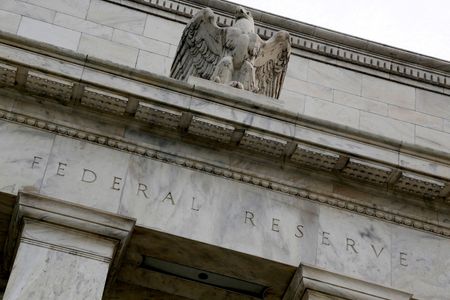 1
1 1
1

By Stephen Culp
NEW YORK (Reuters) – Wall Street closed sharply higher and benchmark Treasury yields hit pause on Friday following signals that the Federal Reserve might consider less aggressive inflation-curbing tactics after November.
All three major U.S. stock surged more than 2%, and notched their biggest Friday-to-Friday percentage gains since June, closing the book on a week marked by mixed earnings, soft economic data and political turmoil in Britain.
The rally gained momentum after U.S. Treasury Secretary Janet Yellen said inflation is not becoming embedded in the economy, and San Francisco Federal Reserve President Mary Daly said it is time for the Fed to consider slowing the pace of its interest rate hikes.
“Despite a weak start for the day equity markets turned around and continue to exhibit intraday volatility. People are tired of selling,” said David Carter, managing director at JPMorgan Private Bank in New York. “It is becoming time to change the station and recall that interest rates can go down as quickly as they have gone up and equities will benefit from this.”
“To quote a country music song, ‘it’s all over but the crying’,” Carter added.
The Dow Jones Industrial Average rose 748.97 points, or 2.47%, to 31,082.56, the S&P 500 gained 86.97 points, or 2.37%, to 3,752.75 and the Nasdaq Composite added 244.87 points, or 2.31%, to 10,859.72.
Meanwhile, the greenback tumbled against the yen, prompting analysts to suspect Tokyo of intervening to halt the Japanese currency’s slide.
“Trading data suggests the Bank of Japan stepped in to bid up the yen despite their comments to the contrary, suggesting currency markets remain extremely uncertain and volatile,” Carter said.
Still, the dollar dipped against a basket of world currencies as the euro gathered strength.
The dollar index fell 0.9%, with the euro up 0.77% to $0.9858.
The Japanese yen strengthened 1.94% versus the greenback to 147.30 per dollar, while Sterling was last trading at $1.1304, up 0.63% on the day.
European shares slid as investors fretted about inflation and the economic effects of central banks’ efforts to rein it in, with the specter of possible recession lurking on the horizon.
The pan-European STOXX 600 index lost 0.62%, while MSCI’s gauge of stocks across the globe gained 1.52%.
Emerging market stocks rose 0.29%. MSCI’s broadest index of Asia-Pacific shares outside Japan closed 0.23% lower, while Japan’s Nikkei lost 0.43%.
After touching the highest level since 2007, 10-year U.S. Treasury yields eased on the news of a potential Fed debate on reducing the size of interest rate hikes in December.
Benchmark 10-year notes last rose 2/32 in price to yield 4.2209%, from 4.226% late on Thursday.
The 30-year bond last fell 56/32 in price to yield 4.3369%, from 4.215% late on Thursday.
Oil prices advanced as hopes of stronger Chinese demand outweighed worries of a global economic slowdown.
U.S. crude rose 0.64% to settle at $85.05 per barrel, while Brent settled at $93.50 per barrel, up 1.21% on the day.
Gold prices rebounded in response to the weaker dollar.
Spot gold added 1.6% to $1,654.16 an ounce.
(Reporting by Stephen Culp; additional reporting by Ankur Banerjee in Singapore and Alun John in London, Editing by Angus MacSwan, Kirsten Donovan and Rosalba O’Brien)